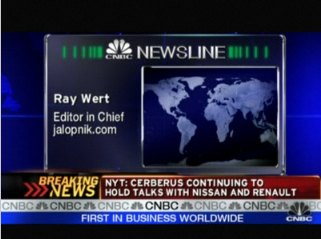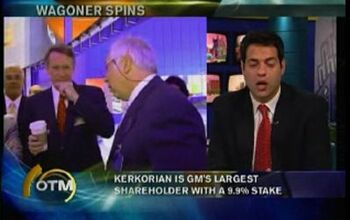Between the Lines: Jalopnik's Ray Wert on GM – Chrysler Merger
Last night, the New York Times “broke” the story that General Motors and Chrysler/Cerberus were discussing a merger. The report lacked only one crucial component: facts. As RF reported in his initial blog on the subject, the story unravels by paragraph two. We learn that the entire story is based on “two people close to the process.” While anonymous attribution is common new industry practice, a story without independent corroboration is a nothing more than rumor— especially when it defies common sense. General Motors’ assertion that they routinely talk to other manufacturers about collaborative efforts doesn’t count. But it does reveal the truth of the matter.
In fact, the GM – Chrysler/Cerberus meetings are an open secret. As The General’s spinmeister intimated, GM regularly engages in tech sharing discussions with a wide range of carmakers. Given Chrysler’s yet-to-be-realized tie-up with Nissan, its decision to provide re-badged minivans for VW and ongoing attempts to create a Chinese hook-up, GM is a logical “partner” for Chrysler ongoing campaign to outsource product development. And cut costs.
GM and ChryCo could be discussing rebadged Malibus. Or a Chrysler badged Cobalt. With materials costs soaring, the two ailing American automakers might be examining the possibility of sharing resources. Or looking for economies of scale re: suppliers. And, lest we forget, General Motors owns 49 percent of endangered auto and mortgage lender GMAC; Chrysler’s masters hold the other 51 percent. If GM and Chrysler are NOT talking to each other about GMAC’s future, there’s something seriously wrong (more wrong?) with both companies’ executive management.
It’s no wonder Times scribes Vlasic and Sorkin backpedal on their GM – Chrysler merger story. They tell us that their two sources estimate chances of a merger are “50-50.” There could be “significant roadblocks,” not including the fact that sewing two losing companies together merely makes a bigger losing company. But the real argumentative implosion comes buried in the story: “neither side has yet to dig into each others’ private financial books and records.” How serious can the merger talks be if the lawyers and accountants haven’t even begun diligence? Answer: they can’t.
Clearly, the providers of “all the news that’s fit to print” didn’t give the merger story a fitness test. In fact, this is a classic example of what GM shill Rush Limbaugh calls “drive by media.”
The 24 hour news cycle (of which this writer, typing after midnight, is a member) was quick to pick up the story and discuss all the implications. The CNBC network, “the recognized world leader in business news,” called in the big guns for comment: Ray Wert of Jalopnik. While we understand the mainstream media’s ongoing fascination with the “new hotness” of blogs, Wert screwed the pooch on this one.
Wert claimed that GM and Chrysler “have two different lineups that actually are very complementary.” This is just wrong. GM and Chrysler have nearly identical lineups, with some niche-product distinctions. Recognizing this, Wert contradicted himself in his next comment. “They’re both looking to sell a lot of large trucks and large SUVS, and it makes sense for them to manufacture them on the same platform.”
The CNBC hosts ask Wert about the financial issues in a merger. His vaguely dishes “My assumption is that Cerberus has probably bit off a lot more than they can chew, and with credit kind of crunching in right now it makes a lot of sense for them to try to jettison a company that isn’t providing something that isn’t to their core business plan.” Except that’s not what anyone is talking about. The story from The New York Times: Cerberus would end up with an enormous stake in the hypothetical GM-Chrysler firm.
CNBC concludes by asking Wert about potential issues with a merged GM-Chrysler and organized labor. “I think it’ll be easier for them to get some economies of scale on UAW talks. It’ll be easier to work out one deal as opposed to two deals.” Efficiency in labor talks is a secondary goal (talking for less time, paying fewer labor lawyers). The actual issue is concessions. There is no quantitative academic evidence to suggest that it would be easier for a gargantuan company to negotiate with the UAW and CAW than two very, very large companies. In fact, odds are good the negotiations would be even stiffer.
CNBC failed in its background research. They should have read the editorial Wert published the same day: “GM Will Go Bankrupt: Why That May Actually Be Good For The General.” Considering Wert’s previously held belief that GM would benefit from Chapter 11 filling, why did he suddenly decided that a GM-Chrysler merger be well-advised? Something to do with publicity perhaps?
All of this discussion blatantly ignores the glaring issue: a GM-Chrysler merger would be a disaster. And that’s the truth.
Latest Car Reviews
Read moreLatest Product Reviews
Read moreRecent Comments
- Kwik_Shift_Pro4X Thankfully I don't have to deal with GDI issues in my Frontier. These cleaners should do well for me if I win.
- Theflyersfan Serious answer time...Honda used to stand for excellence in auto engineering. Their first main claim to fame was the CVCC (we don't need a catalytic converter!) engine and it sent from there. Their suspensions, their VTEC engines, slick manual transmissions, even a stowing minivan seat, all theirs. But I think they've been coasting a bit lately. Yes, the Civic Type-R has a powerful small engine, but the Honda of old would have found a way to get more revs out of it and make it feel like an i-VTEC engine of old instead of any old turbo engine that can be found in a multitude of performance small cars. Their 1.5L turbo-4...well...have they ever figured out the oil dilution problems? Very un-Honda-like. Paint issues that still linger. Cheaper feeling interior trim. All things that fly in the face of what Honda once was. The only thing that they seem to have kept have been the sales staff that treat you with utter contempt for daring to walk into their inner sanctum and wanting a deal on something that isn't a bare-bones CR-V. So Honda, beat the rest of your Japanese and Korean rivals, and plug-in hybridize everything. If you want a relatively (in an engineering way) easy way to get ahead of the curve, raise the CAFE score, and have a major point to advertise, and be able to sell to those who can't plug in easily, sell them on something that will get, for example, 35% better mileage, plug in when you get a chance, and drives like a Honda. Bring back some of the engineering skills that Honda once stood for. And then start introducing a portfolio of EVs once people are more comfortable with the idea of plugging in. People seeing that they can easily use an EV for their daily errands with the gas engine never starting will eventually sell them on a future EV because that range anxiety will be lessened. The all EV leap is still a bridge too far, especially as recent sales numbers have shown. Baby steps. That's how you win people over.
- Theflyersfan If this saves (or delays) an expensive carbon brushing off of the valves down the road, I'll take a case. I understand that can be a very expensive bit of scheduled maintenance.
- Zipper69 A Mini should have 2 doors and 4 cylinders and tires the size of dinner plates.All else is puffery.
- Theflyersfan Just in time for the weekend!!! Usual suspects A: All EVs are evil golf carts, spewing nothing but virtue signaling about saving the earth, all the while hacking the limbs off of small kids in Africa, money losing pits of despair that no buyer would ever need and anyone that buys one is a raging moron with no brains and the automakers who make them want to go bankrupt.(Source: all of the comments on every EV article here posted over the years)Usual suspects B: All EVs are powered by unicorns and lollypops with no pollution, drive like dreams, all drivers don't mind stopping for hours on end, eating trays of fast food at every rest stop waiting for charges, save the world by using no gas and batteries are friendly to everyone, bugs included. Everyone should torch their ICE cars now and buy a Tesla or Bolt post haste.(Source: all of the comments on every EV article here posted over the years)Or those in the middle: Maybe one of these days, when the charging infrastructure is better, or there are more options that don't cost as much, one will be considered as part of a rational decision based on driving needs, purchasing costs environmental impact, total cost of ownership, and ease of charging.(Source: many on this site who don't jump on TTAC the split second an EV article appears and lives to trash everyone who is a fan of EVs.)


































Comments
Join the conversation
Advantages of tie-up: 1) Buick, Hummer, Dodge, Chrysler, Saturn, etc get dumped into "new" Chrysler, which then files Ch.7. 2) GM gets Chrysler's $11B + double Fed bailout which is close to $15B 3) Board & mgmt get huge bonuses 4) What UAW? Current contract burned & buried. Tons saved. Disadvantages: 1) Everyone else is screwed. Dealers, workers, suppliers, etc. 2) GM fire sale prices + Chrysler quality issues = less market share than they had seperately.
So nobody thinks the low gas prices will bring some of the big vehicle consumers back to the dealers soon? Do you think the cheap gas won't last? Do you think the credit crunch just means that there aren't enough people who can afford or will afford a new vehicle?